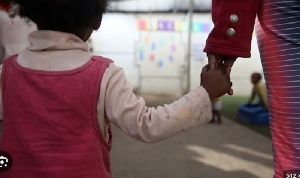The 2022 Births and Deaths Registry Statistical Report has revealed that 2,099 out of the 677,140 children born that year have doubtful paternity. These births are characterized by the unknown identity of the fathers.
The report was launched in Accra on Thursday, May 9. This inaugural report was compiled by the Births and Deaths Registry with contributions and support from partner organizations, including the Ghana Health Service and the National Identification Authority.
The report further disclosed that the Greater Accra Region recorded the highest number of children born with doubtful paternity at 446. Conversely, the North East Region reported the lowest with just 9 such cases.
Following in numbers were the Central Region with 328, Upper East with 232, Eastern with 223, Western with 220, and Ashanti with 180. The remaining regions were Volta with 180, Western North with 55, Ahafo with 51, Oti with 50, Northern with 42, Bono with 41, Bono East with 38, Upper West with 33, and Savannah with 19.
Osei Bonsu Amoah, Minister of State at the Ministry of Local Government, Decentralisation and Rural Development, addressed the attendees, stating that the statistics arrived at an opportune time. There has been an increasing demand for access to birth and death registration data by researchers, policymakers, and other stakeholders. This demand is driven by the recognition of data's importance in improving public health outcomes, addressing social inequalities, and promoting evidence-based decision-making.
The Minister thanked the Acting Registrar and her team for compiling the data and urged the Government and development partners to leverage the report to forge a brighter and more inclusive future for all.
Madam Henrietta Lamptey, Acting Registrar of the Births and Deaths Registry stated that the maiden report underscores the Registry's commitment to providing information on every birth and death in the country. She emphasized that understanding the population's size and characteristics is crucial for effective socioeconomic planning and informed decision-making.
Vital statistics, she noted, are essential for setting goals, assessing social and economic plans, and monitoring health and population intervention programs implemented by the government. "Statistics such as the number of births, deaths, and life expectancy are instrumental in this regard," she explained.
Madam Lamptey assured that the Registry would ensure the timely and accurate registration of every birth and death to inform decision-making and planning.
In addition to statistics on children born with doubtful paternity, the report also covers other topics such as place of birth, timeliness of registration, sex ratio, facility of birth, and death registration statistics.
Regional News of Friday, 10 May 2024
Source: GNA













